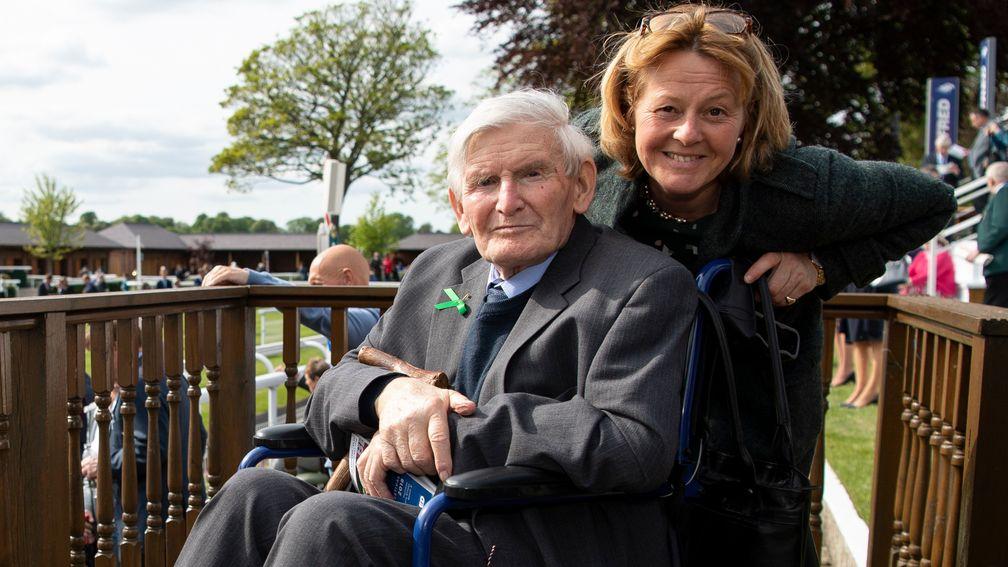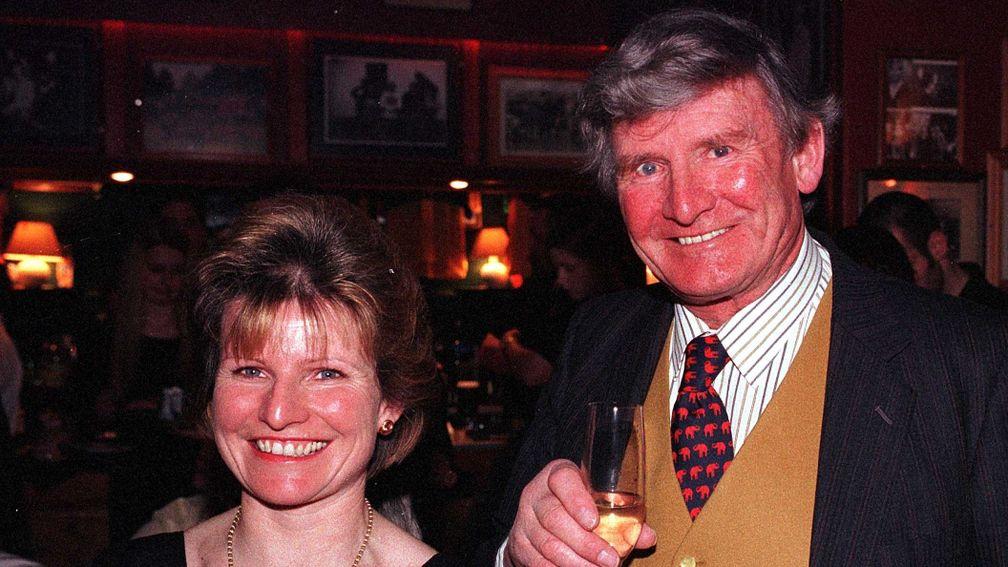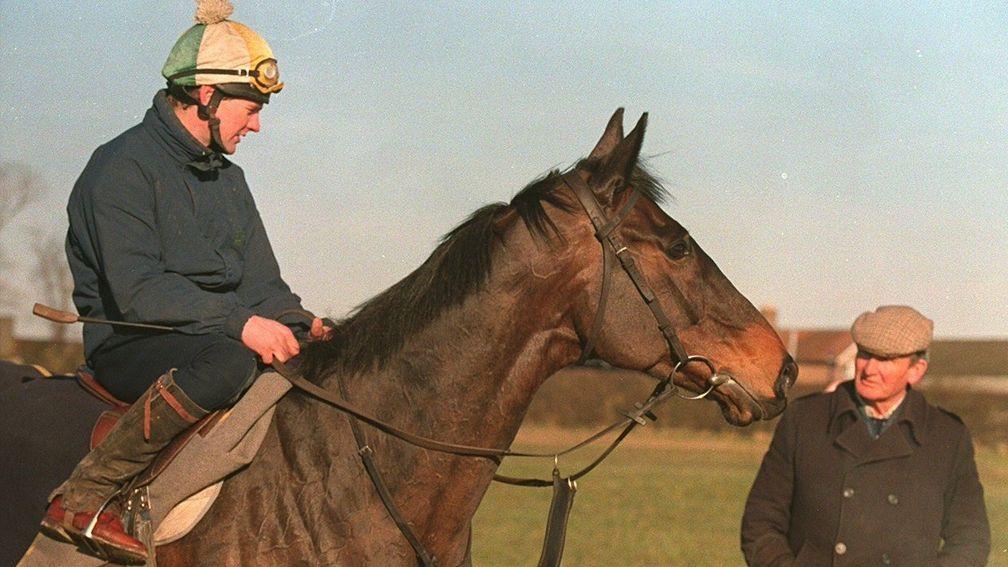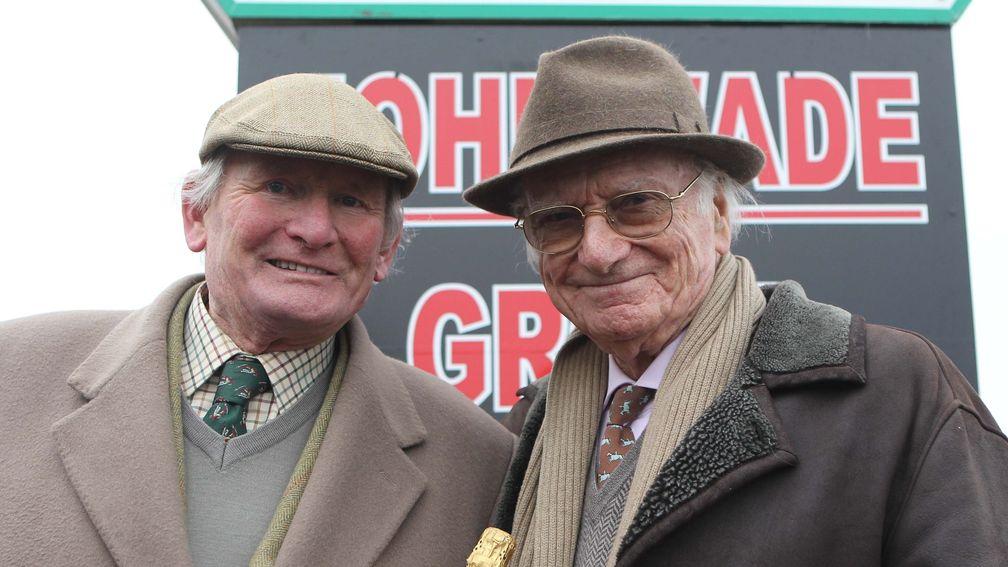The modest and respected man who masterfully guided Jodami to Gold Cup glory

Peter Beaumont, who trained for 25 years at Foulrice Farm near Brandsby in North Yorkshire, is best remembered for sending out Jodami to win the 1993 Tote Cheltenham Gold Cup.
Bought as an unraced store horse, Jodami won a bumper at Kelso at odds of 33-1 on his racecourse debut in March 1990 and in an eight-year career took both his trainer and his owner John Yeadon to heights of which they could only have dreamed.
Beaumont was born at Harrogate in 1934. His father Alfred was a farmer with a livery yard in the picturesque village of Ripley with sheep, hire-out ponies, hunters and a few point-to-pointers his stock-in trade.
Naturally, the young Peter was in the saddle soon after he could walk, and although he rode a few point-to-point winners and enjoyed one success under Rules, his career as an amateur was cut short abruptly by a bad fall.
Having had an uneasy relationship with his father, Beaumont did not take over the family business. Instead, he began his working life scraping a living on a council-owned smallholding near Boroughbridge. That changed when Joyce Hey, who had been one of his father's owners, bought Foulrice Farm and invited him to be her tenant, although he eventually bought it.

Together with wife Margaret, son Stuart and daughter Anthea, he moved to the green acres just north of York, although the family had to endure several months in a caravan while builders completed work on the house that was to be home for the rest of his life.
In those early days he was essentially a farmer, although, like many of his ilk, he trained a few horses for point-to-pointing.
Among the early few was a fragile gelding by the name of Sporting Luck who was to prove the springboard for Beaumont's successful trainer career.
Owned by his landlord, the bold-jumping frontrunner needed time and patience and was risked only when conditions were suitable. However, he became something of a legend by winning 20 of his 27 point-to-points, including as a 12-year-old the prestigious Lady Dudley Cup, which back in the 1970s was regarded as the Gold Cup of the point-to-point circuit.
For the next few years he continued to farm and train point-to-pointers, but in 1986 he took the plunge and was granted his first licence to train. In September of that year the former point-to-pointer J-J-Henry, ridden by daughter Anthea, gave him his first winner under Rules at Perth and the following year his first big-race win when landing the Nottingham Champion Novices' Chase.
Four years later J-J-Henry put both trainer and rider on racing's map by winning the John Hughes Memorial Chase, the Topham Trophy as it is now, with regular rider Anthea entering the record books as the first woman to ride a winner over the National fences.
If Beaumont had any doubts about making the transition into the professional game, J-J-Henry, a prolific winners over fences, was the horse who dispelled them, although by the time he won the Aintree race Jodami had already taken his first steps to stardom.
Jodami, bought privately from the Curragh-based trainer Pat Phelan as an unbroken three-year-old, was a typical Beaumont horse, a big, strong sort who looked the epitome of the staying chaser with which his trainer specialised. Bumpers and hurdles were just a stepping stone. Chasing was his game. It was by today's standards an old-fashioned, patient approach, and although Beaumont trained the 'old-fashioned' way and had patience in abundance he also moved with the times and eventually installed a woodchip gallop and regularly weighed and blood-tested his horses.

Rev them up he did not, as they were allowed all the time they needed to mature, so it was not surprising that Jodami started at 33-1 for that debut run. Beaumont was not a 'bumper' man. However, those who were at Kelso that day claimed there was a buzz around the track that the animal they had seen was no ordinary horse. He didn't look ordinary either as he strolled home by seven lengths from a field that included the subsequent Cleeve Hurdle winner Mudahim.
In his second season, Jodami won five of his six races over hurdles, culminating in the valuable Scottish Farms Dairy Foods Novice Handicap Hurdle at Ayr's Scottish Grand National meeting. In those days that was a race with a pedigree of producing top-class horses. He won it by 12 lengths.
That was his last last race over hurdles, for the following season he embarked on his chasing career, starting off with another win at Kelso. Although he won only two more races during the campaign, he showed his potential by finishing runner-up to the classy Bradbury Star in the Grade 2 Mumm Mildmay Novice Chase at Aintree and then fourth under top weight in the hotly contested staying novice handicap chase at the Punchestown festival.
Beaumont and Yeadon's reward for their patience came the following year when Jodami continued on his upward curve, graduating from handicaps to winning the first of his three consecutive Grade 1 Irish Hennessy Gold Cups at Leopardstown before taking the biggest prize of all the Tote Cheltenham Gold Cup under his then regular rider Mark Dwyer. The name of Peter Beaumont thus became etched into jumping history.
The following year, after a second Irish Hennessy win, Jodami was beaten narrowly by French raider The Fellow in the Gold Cup, although his trainer maintained a last-fence mistake cost him the race.
A third consecutive Irish Hennessy came in 1995 but luck deserted him in the Gold Cup the following month for he was virtually pulled up, having suffered a bang to a knee.
He missed the Irish Hennessy in 1996, but did go for the Irish Grand National, in which he ran a mighty race under top weight to finish second to Feathered Gale, with Robert Alner's Cool Dawn, who went on to 1998 Gold Cup glory, six lengths back in third when in receipt of 26lb.
Jodami returned to Leopardstown to bid for a fourth Irish Hennessy in 1997, but although he finished second to Danoli, he broke down late on and was then retired having won 18 of his 39 races and accumulated prize-money of £478,000.
Despite all that success Beaumont never changed one jot. He was always the same modest, softly spoken person who never talked up either his horses or himself. If he ever said a horse was 'not bad' you knew he thought the horse was pretty damn good.
A second Cheltenham Festival winner came his way in 2002 when Hussard Collonges and Russ Garritty won the Royal and Sunalliance Novices' Chase. Unlike Jodami, he did not really continue to progress and, although he ran some good races, never won again.
In between those festival winners Beaumont trained some smart chasers, notably Young Kenny, who won the Scottish and Midlands Nationals in 1999 and the Becher Chase the following year. He also fell when carrying top weight in Papillon's 2000 Grand National, in which Beaumont's Niki Dee was a creditable third.
Bobby Grant, a rare horse who came to him from another yard, was another good money-spinner, winning Haydock's Tommy Whittle Chase in 1999 and 2000. Curiously, his final winner came on the Flat at Ripon in June 2009.

Although dealt a huge blow by the sudden death of his wife Margaret in 2000, Beaumont carried on training with the help of Anthea and son Stuart until dwindling numbers and a lack of decent horses persuaded him to call it a day at the age of 75 in 2010.
In those 25 years with a licence Beaumont rarely had more than 30 horses in training at one time, but sent out 245 winners over jumps in Britain, three in Ireland and seven on the Flat. Numerically, his best seasonal was 25 in 1996-97. Although he lacked mobility in his later years, he was a regular visitor at Wetherby and enjoyed passing the time with his many friends and former colleagues.
Peter Beaumont was a gentleman. A kind, thoughtful and quiet man, he was one of the most respected figures in racing. You would struggle long and hard to find anyone who had a bad word to say about him.
Published on 30 March 2020inNews
Last updated 16:26, 30 March 2020
- Merci Olivier! No final winner for Olivier Peslier but the world of racing unites in saluting the end of a great career
- The latest edition of the Racing Post is available to read online now - here's how you can access it
- How Smart View recorded a 76 per cent profit at the Cheltenham Festival
- Smart View is available on the Racing Post app - how to read the revolutionary new racecard
- Levy reform talks 'accelerating' as clock ticks down to April deadline for agreement
- Merci Olivier! No final winner for Olivier Peslier but the world of racing unites in saluting the end of a great career
- The latest edition of the Racing Post is available to read online now - here's how you can access it
- How Smart View recorded a 76 per cent profit at the Cheltenham Festival
- Smart View is available on the Racing Post app - how to read the revolutionary new racecard
- Levy reform talks 'accelerating' as clock ticks down to April deadline for agreement